Turner chassis steering rack width
Discussion
The original steering rack of my 1800S (mk IV) has been replaced with a standard Triumph Spitfire unit for some unknown reason. As the Spitfire rack is wider than the original one the car suffers from terrible bump steer. A previous owner had tried to correct the problem by raising the rack by about 30 mm by welding in new mounts on top of the originals but that does not improve anything
I am going to shorten a Triumph rack to fit to the car. So far I have made measurements of the front end suspension geometry (with tape measure) and made drawings at various ride heights to get the correct width. However, it is difficult to measure everything correctly and I might have missed something. I ended up getting 660 mm from inner tie rod ball joint to inner tie rod ball joint (with added compensation for the steering arm outboard offset relative to KPI).
Measuring the old mounts in the chassis (difficult as they are partly welded over when the rack was raised) is seems as the housing of the original rack was about 30 mm shorter than the Triumph unit. If the actual rack was shortened the same length that would give a width from inner tie rod to inner tie rod of about 670 mm for the TVR (Spitfire is close to 700 mm).
If somebody possibly could measure the dimension of an original TVR rack it would be of great help to me. The width of the housing is interesting but most important is the total width between the inner tie rod ends as that is what sets the geometry.
I think the racks are the same on all 1800S mk III, mk IV, Vixen S1 and Griffith 200/400. Possibly on later Vixens as well.
Thanks for your assistance!
I am going to shorten a Triumph rack to fit to the car. So far I have made measurements of the front end suspension geometry (with tape measure) and made drawings at various ride heights to get the correct width. However, it is difficult to measure everything correctly and I might have missed something. I ended up getting 660 mm from inner tie rod ball joint to inner tie rod ball joint (with added compensation for the steering arm outboard offset relative to KPI).
Measuring the old mounts in the chassis (difficult as they are partly welded over when the rack was raised) is seems as the housing of the original rack was about 30 mm shorter than the Triumph unit. If the actual rack was shortened the same length that would give a width from inner tie rod to inner tie rod of about 670 mm for the TVR (Spitfire is close to 700 mm).
If somebody possibly could measure the dimension of an original TVR rack it would be of great help to me. The width of the housing is interesting but most important is the total width between the inner tie rod ends as that is what sets the geometry.
I think the racks are the same on all 1800S mk III, mk IV, Vixen S1 and Griffith 200/400. Possibly on later Vixens as well.
Thanks for your assistance!
I wonder if it changed during the years. The stock mounts on my cars certainly only fits a rack that is more narrow than a Spitfire rack. But then, mine is a mk IV. According to what I found on the web the saloon racks (including 2000)were wider than the ones in Spitfire (Herald) by about 10 mm. In addition the inner tie rods were longer as the whole car was wider. The same type of rack was also found on TR models but they were some 10 mm more narrow than in Spitfire, possibly the most narrow of the Triumph racks. But these numbers are of the web and they might very well be wrong.
Anyway, I'm looking for the best possible solution to suit my car (but preferably using a stock type of rack). If it is different in width and/or position to what TVR used I will be very happy with that.
Looking forward to see what numbers Neil (or anybody else for that matter) can find.
Anyway, I'm looking for the best possible solution to suit my car (but preferably using a stock type of rack). If it is different in width and/or position to what TVR used I will be very happy with that.
Looking forward to see what numbers Neil (or anybody else for that matter) can find.
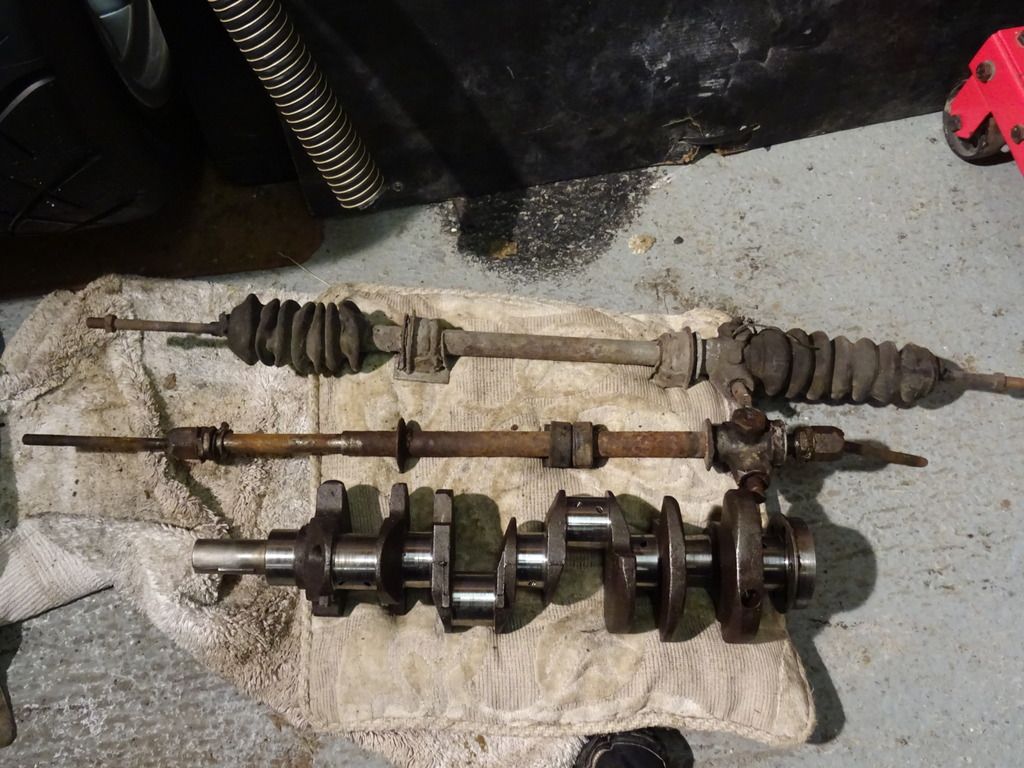
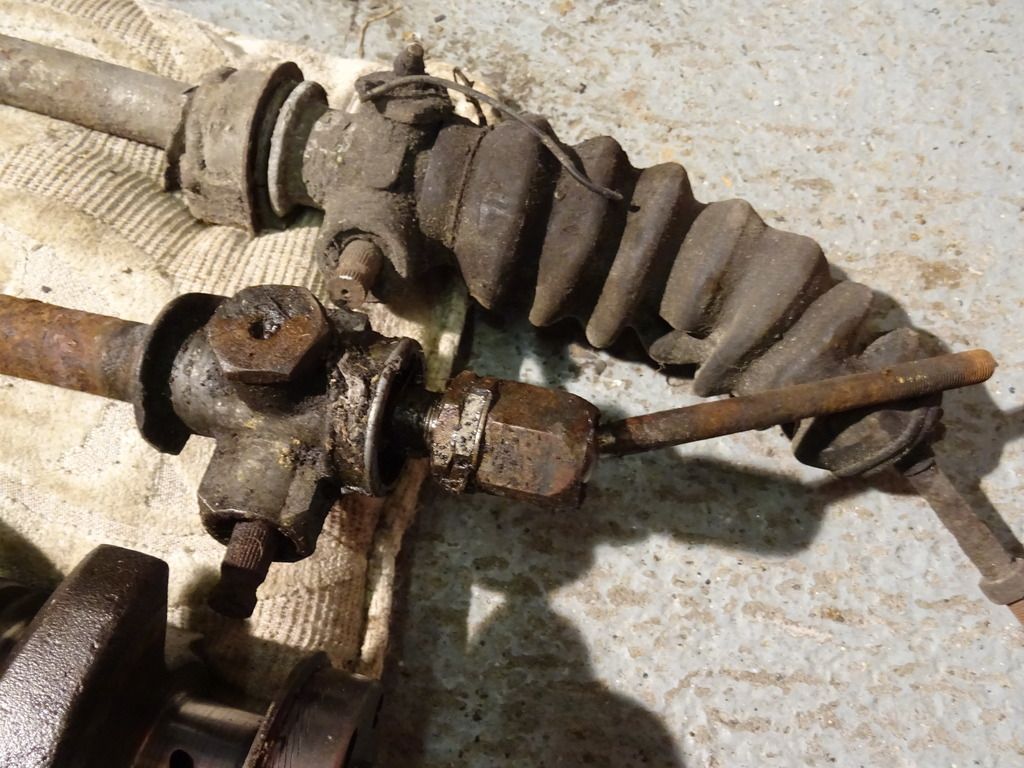
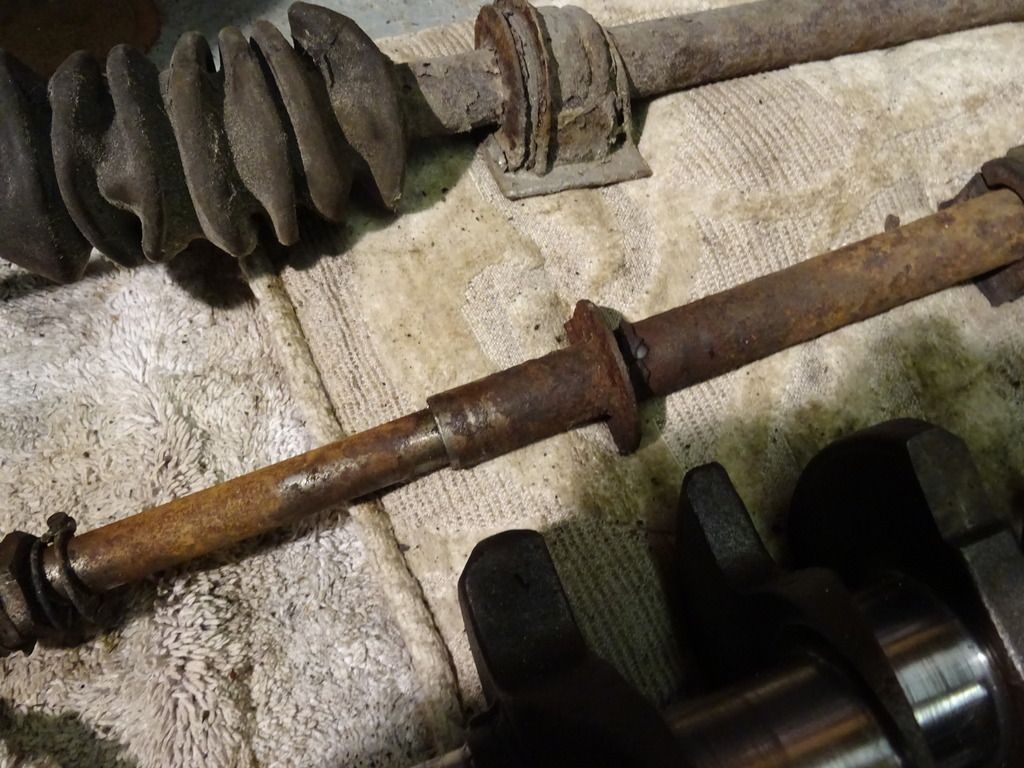
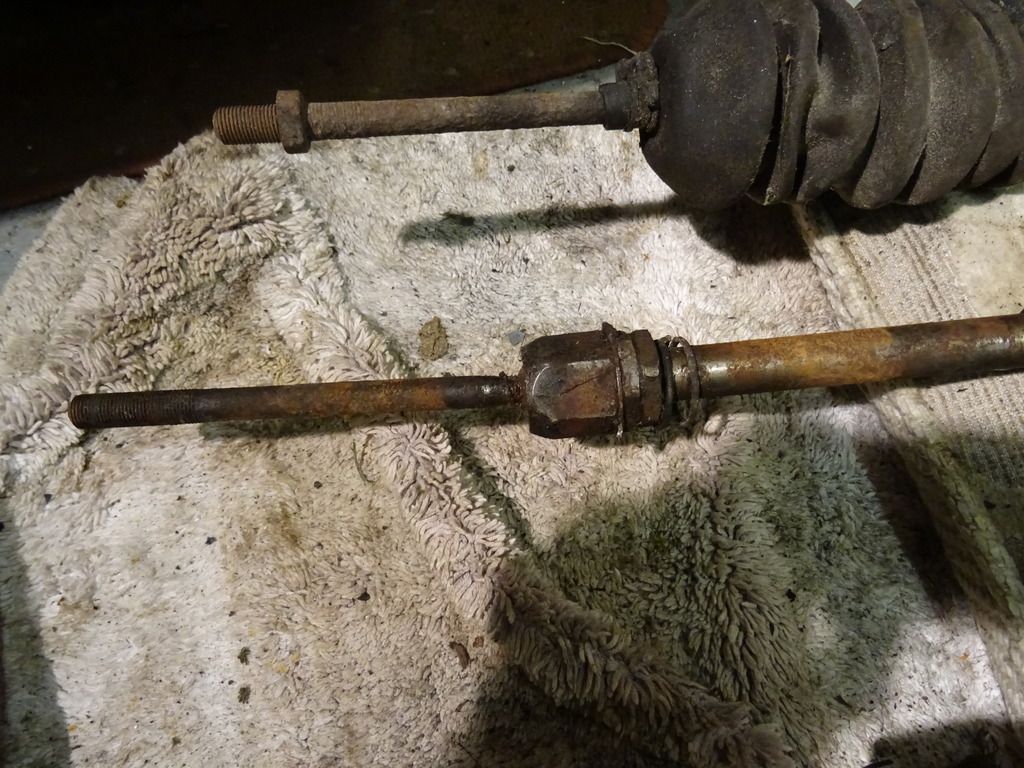
Measurements as follows..
Tip to Tip 40 3/4"
Int Flange - Int flange 12 5/8"
Ext flange - Ext Flange 13"
Rack tube end to Ext Flange 2 1/4"
Steering arms…Same both sides 6 5/16 End to beginning of ball where it disappears into housing (jesus nut)
Jesus nut end to jesus nut end 28 1/8"
Edited by Dollyman1850 on Wednesday 21st December 11:40
Edited by Dollyman1850 on Wednesday 21st December 11:42
Brilliant Neil, thanks!
I just measured my spare rack, of a Spitfire 1500, and the numbers are identical. The one in the TVR is also the same.
Did the rack you measured come of your blue Griffen Neil? Or what year TVR is it from. According to some sources I have found the TVR racks are supposed to have been cut in the middle and welded back together again with one or two inches removed, for instance in this thread http://www.pistonheads.com/gassing/topic.asp?h=3&a... If that was the case wonder if some cars were built with narrow racks and some wide?
Anyway, I think I will check the whole front end measures of my car again and make a new drawing just to be sure. Then I will cut my spare rack to the width that will give the best theoretical result regardless of what TVR did back in the days. The Spitfire geometry is not doing any good in TVR that´s for sure!
I just measured my spare rack, of a Spitfire 1500, and the numbers are identical. The one in the TVR is also the same.
Did the rack you measured come of your blue Griffen Neil? Or what year TVR is it from. According to some sources I have found the TVR racks are supposed to have been cut in the middle and welded back together again with one or two inches removed, for instance in this thread http://www.pistonheads.com/gassing/topic.asp?h=3&a... If that was the case wonder if some cars were built with narrow racks and some wide?
Anyway, I think I will check the whole front end measures of my car again and make a new drawing just to be sure. Then I will cut my spare rack to the width that will give the best theoretical result regardless of what TVR did back in the days. The Spitfire geometry is not doing any good in TVR that´s for sure!
Grantura SWE said:
Brilliant Neil, thanks!
I just measured my spare rack, of a Spitfire 1500, and the numbers are identical. The one in the TVR is also the same.
Did the rack you measured come of your blue Griffen Neil? Or what year TVR is it from. According to some sources I have found the TVR racks are supposed to have been cut in the middle and welded back together again with one or two inches removed, for instance in this thread http://www.pistonheads.com/gassing/topic.asp?h=3&a... If that was the case wonder if some cars were built with narrow racks and some wide?
Anyway, I think I will check the whole front end measures of my car again and make a new drawing just to be sure. Then I will cut my spare rack to the width that will give the best theoretical result regardless of what TVR did back in the days. The Spitfire geometry is not doing any good in TVR that´s for sure!
I will double check with the one on the car tomorrow.I just measured my spare rack, of a Spitfire 1500, and the numbers are identical. The one in the TVR is also the same.
Did the rack you measured come of your blue Griffen Neil? Or what year TVR is it from. According to some sources I have found the TVR racks are supposed to have been cut in the middle and welded back together again with one or two inches removed, for instance in this thread http://www.pistonheads.com/gassing/topic.asp?h=3&a... If that was the case wonder if some cars were built with narrow racks and some wide?
Anyway, I think I will check the whole front end measures of my car again and make a new drawing just to be sure. Then I will cut my spare rack to the width that will give the best theoretical result regardless of what TVR did back in the days. The Spitfire geometry is not doing any good in TVR that´s for sure!
These are from various sources so I will doubly make sure…They could actually be Vixen S2 since I have also been known to mess with those….
EDITED….Just checked in Garage and the Racer looks different…I cannot tell exactly because the Gaitors are on the car but the feeling is that between both Jesus Nuts IE Where the ball ends of the Steering arms are seems to be about 26-ish inches..IE about 2 inches narrower…The rack arms are also shorter and have extensions. I think both of the ones in the pic are S2 Vixen and Different. To get you exact dimensions I would have to remove gaiters.
I think the Outer rack tube and pinion are std with maybe the end of the rack tube shortened and the inner rack shortened…The distance between flanges I think is the same.
Perhaps someone has a one off the car??
Edited by Dollyman1850 on Wednesday 21st December 21:18
Thanks Neil. Useful information. Please do not remove or unbolt anything just for the sake of helping me!
Can you possibly check the longitudinal position in the car as well. Meaning how far forward the rack sits relative to… … something. Preferably, the end of the steering arm at the wheel but that is hard to measure. As I sure you know that has an influence on Ackerman steering.
I must add that I somewhat jumped to conclusion that the Spitfire width is no good. In my car with raised rack the bumpsteer is absolutely terrible. If the suspension travels 4” up/down the tie rod/steering arm joint shifts about 1” sideways, measured on just one side of the car. As the general conclusion seemed to be that the TVR racks always were shortened I did not even try the Spitfire in the standard position. However when I checked it in my drawing and moved it down to stock position it turned out to be reasonably ok. Not perfect in any way but acceptable. With limited suspension travel like in a sports car it can be used.
I must think a little more about what length that provides minimum bump steer and acceptable Ackermann steering. Possibly make some more measurements on the car as well.
Thanks again for help!
//G
Can you possibly check the longitudinal position in the car as well. Meaning how far forward the rack sits relative to… … something. Preferably, the end of the steering arm at the wheel but that is hard to measure. As I sure you know that has an influence on Ackerman steering.
I must add that I somewhat jumped to conclusion that the Spitfire width is no good. In my car with raised rack the bumpsteer is absolutely terrible. If the suspension travels 4” up/down the tie rod/steering arm joint shifts about 1” sideways, measured on just one side of the car. As the general conclusion seemed to be that the TVR racks always were shortened I did not even try the Spitfire in the standard position. However when I checked it in my drawing and moved it down to stock position it turned out to be reasonably ok. Not perfect in any way but acceptable. With limited suspension travel like in a sports car it can be used.
I must think a little more about what length that provides minimum bump steer and acceptable Ackermann steering. Possibly make some more measurements on the car as well.
Thanks again for help!
//G
I can't understand why the previous owner raised the steering rack mounts by 30mm? Unless the rack tube was originally lower than the tie rods with the car sitting normally then surely this is going to make bump steer much worse? I can't pop out and look at my S2 at the mo because it's in storage while I sort out my garage but I'm pretty sure that when the suspension is under load with the full weight of the car, the tie rods still slope at a very slight angle downwards. I can't say there is no bump steer but certainly never considered it to be such a problem as to spoil the handling of the car. I replaced my original rack with a spitfire rack and have had no problems. So whats different about the early 1800s or S1 Vixen chassis up front that would make such a difference to the steering geometry and performance?
tomtrout said:
I can't understand why the previous owner raised the steering rack mounts by 30mm? Unless the rack tube was originally lower than the tie rods with the car sitting normally then surely this is going to make bump steer much worse? I can't pop out and look at my S2 at the mo because it's in storage while I sort out my garage but I'm pretty sure that when the suspension is under load with the full weight of the car, the tie rods still slope at a very slight angle downwards. I can't say there is no bump steer but certainly never considered it to be such a problem as to spoil the handling of the car. I replaced my original rack with a spitfire rack and have had no problems. So whats different about the early 1800s or S1 Vixen chassis up front that would make such a difference to the steering geometry and performance?
S2 totally Different Andy.N
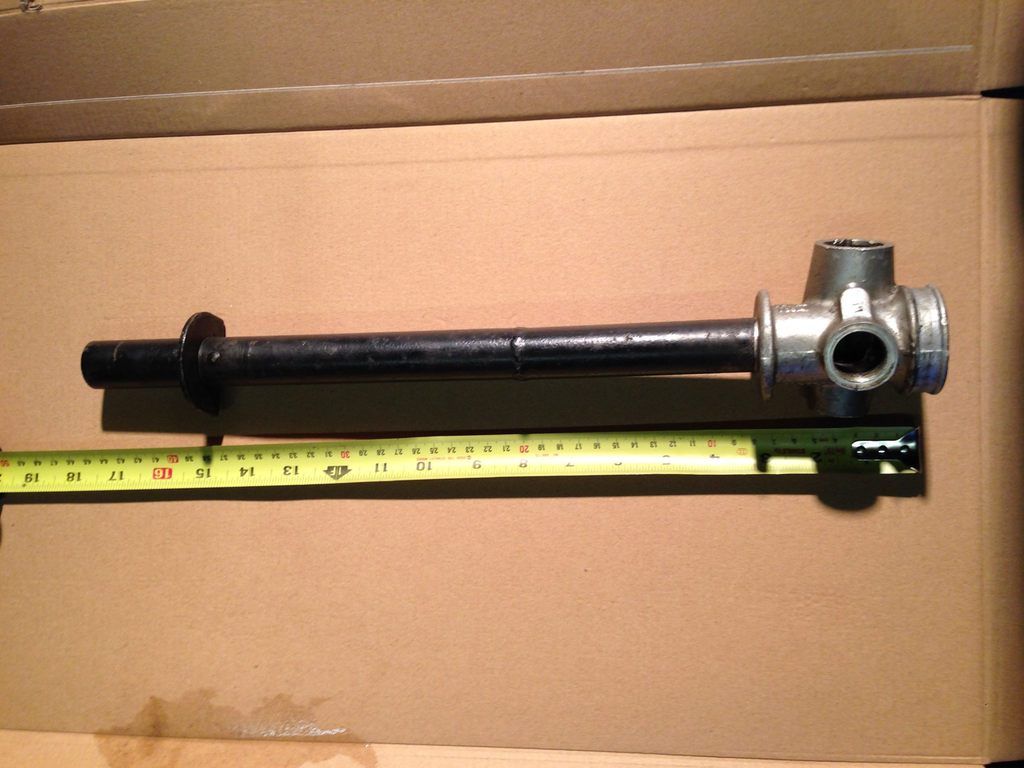
This is a LHD triumph modified steering rack. Overall length 44cm the centre of weld line to alloy casting is 11.8cm. Casting number 5l03959
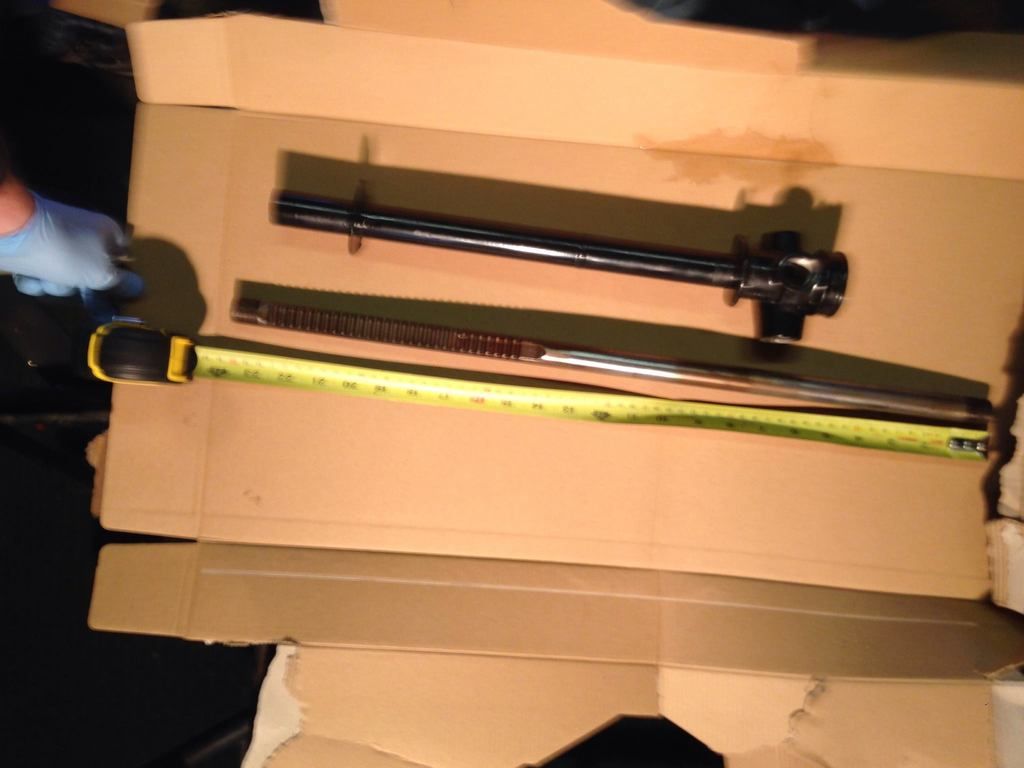
The rack same length. Centre shaft 59.7cm or 23.5 inch. The cut line is 11.5 inch or 31.5cm from rack toothed end
These photos and dimensions are kindly supplied by Neil Walker who may have a LHD rack available for sale.
Hope this is what you need.
N.
I have not had any time to work on the TVR at all so far this year. Today I took the afternoon off from work and had three hours.
Just wanted to share a few photos of how the steering rack is installed in my car.
Please note the square section of steel tubing fitted between the rack and the mount in the chassis.

I removed the rack and the radiator to get access so the tubing can be removed. Unfortunately that was as far as I made it today. As the car has not been driven in four years I also spent some time draining the fuel tank of old petrol to avoid problems.

For those of you who wonder what the engine bay of a 1800S looks like with a Volvo B18/B20 fitted here is a photo.
The heater is an aftermarket thing fitted by a previous owner and will be replaced with the correct Smiths item. Radiator is from a Volvo 240 and not very period but it is cheap and light weight. Carbs are SU HS8, from a Jaguar, on a ported Volvo intake manifold.
In case you don't know this is the same type of engine as fitted in the Marcos 1800 GT and the Volvo 120 (Amazon). Mine is a 2-litre unit.

Just wanted to share a few photos of how the steering rack is installed in my car.
Please note the square section of steel tubing fitted between the rack and the mount in the chassis.

I removed the rack and the radiator to get access so the tubing can be removed. Unfortunately that was as far as I made it today. As the car has not been driven in four years I also spent some time draining the fuel tank of old petrol to avoid problems.

For those of you who wonder what the engine bay of a 1800S looks like with a Volvo B18/B20 fitted here is a photo.
The heater is an aftermarket thing fitted by a previous owner and will be replaced with the correct Smiths item. Radiator is from a Volvo 240 and not very period but it is cheap and light weight. Carbs are SU HS8, from a Jaguar, on a ported Volvo intake manifold.
In case you don't know this is the same type of engine as fitted in the Marcos 1800 GT and the Volvo 120 (Amazon). Mine is a 2-litre unit.

Spent some time with my angle grinder today and removed the square tubes. I refitted the rack in the position it was supposed to be fitted. The result was, no bump steer. Just as can be expected from a well designed chassis. Ok, I have not made super careful measurements but at least there are not any noticeble steering anymore.
So for now I will just fit the old, Triumph lenght, rack as it is. Next winter I will look in to possible mods (shortening the housing). Although I cannot really see the reason for doing it as it does not improve bump or ackerman steering. But there must have been some reason for doing it.... Next winter I might change the car from RHD to LHD as well as I have more or less all the parts (I know you guys in the UK think I'm nuts now but after all the car has spent more time of its life in Sweden than in the UK so it makes sense).
So for now I will just fit the old, Triumph lenght, rack as it is. Next winter I will look in to possible mods (shortening the housing). Although I cannot really see the reason for doing it as it does not improve bump or ackerman steering. But there must have been some reason for doing it.... Next winter I might change the car from RHD to LHD as well as I have more or less all the parts (I know you guys in the UK think I'm nuts now but after all the car has spent more time of its life in Sweden than in the UK so it makes sense).
Gassing Station | TVR Classics | Top of Page | What's New | My Stuff




